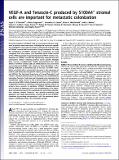| dc.contributor.author | Kalluri, Raghu | |
| dc.contributor.author | O’Connell, Joyce T. | |
| dc.contributor.author | Sugimoto, Hikaru | |
| dc.contributor.author | Cooke, Vesselina G. | |
| dc.contributor.author | MacDonald, Brian A. | |
| dc.contributor.author | Mehta, Ankit I. | |
| dc.contributor.author | LeBleu, Valerie Sandra | |
| dc.contributor.author | Dewar, Rajan | |
| dc.contributor.author | Rocha, Rafael M. | |
| dc.contributor.author | Brentani, Ricardo R. | |
| dc.contributor.author | Resnick, Murray B. | |
| dc.contributor.author | Neilson, Eric G. | |
| dc.contributor.author | Zeisberg, Michael | |
| dc.date.accessioned | 2012-07-27T17:57:08Z | |
| dc.date.available | 2012-07-27T17:57:08Z | |
| dc.date.issued | 2011-09 | |
| dc.identifier.issn | 0027-8424 | |
| dc.identifier.issn | 1091-6490 | |
| dc.identifier.uri | http://hdl.handle.net/1721.1/71874 | |
| dc.description.abstract | Increased numbers of S100A4[superscript +] cells are associated with poor prognosis in patients who have cancer. Although the metastatic capabilities of S100A4[superscript +] cancer cells have been examined, the functional role of S100A4[superscript +] stromal cells in metastasis is largely unknown. To study the contribution of S100A4[superscript +] stromal cells in metastasis, we used transgenic mice that express viral thymidine kinase under control of the S100A4 promoter to specifically ablate S100A4[superscript +] stromal cells. Depletion of S100A4[superscript +] stromal cells significantly reduced metastatic colonization without affecting primary tumor growth. Multiple bone marrow transplantation studies demonstrated that these effects of S100A4[superscript +] stromal cells are attributable to local non–bone marrow-derived S100A4+ cells, which are likely fibroblasts in this setting. Reduction in metastasis due to the loss of S100A4[superscript +] fibroblasts correlated with a concomitant decrease in the expression of several ECM molecules and growth factors, particularly Tenascin-C and VEGF-A. The functional importance of stromal Tenascin-C and S100A4[superscript +] fibroblast-derived VEGF-A in metastasis was established by examining Tenascin-C null mice and transgenic mice expressing Cre recombinase under control of the S100A4 promoter crossed with mice carrying VEGF-A alleles flanked by loxP sites, which exhibited a significant decrease in metastatic colonization without effects on primary tumor growth. In particular, S100A4[superscript +] fibroblast-derived VEGF-A plays an important role in the establishment of an angiogenic microenvironment at the metastatic site to facilitate colonization, whereas stromal Tenascin-C may provide protection from apoptosis. Our study demonstrates a crucial role for local S100A4[superscript +] fibroblasts in providing the permissive “soil” for metastatic colonization, a challenging step in the metastatic cascade. | en_US |
| dc.description.sponsorship | National Institutes of Health (U.S.) (Grant no. DK55001) | en_US |
| dc.description.sponsorship | National Institutes of Health (U.S.) (Grant no. CA125550) | en_US |
| dc.description.sponsorship | National Institutes of Health (U.S.) (Grant no. CA155370) | en_US |
| dc.description.sponsorship | National Institutes of Health (U.S.) (Grant no. CA151925) | en_US |
| dc.description.sponsorship | National Institutes of Health (U.S.) (Grant no. DK81687) | en_US |
| dc.description.sponsorship | National Institutes of Health (U.S.) Developmental Biology Training (Grant no. GM07226) | en_US |
| dc.description.sponsorship | United States. Dept. of Defense. Breast Cancer Predoctoral Traineeship Award (BC083229) | en_US |
| dc.language.iso | en_US | |
| dc.publisher | National Academy of Sciences of the United States of America | en_US |
| dc.relation.isversionof | http://dx.doi.org/10.1073/pnas.1109493108 | en_US |
| dc.rights | Article is made available in accordance with the publisher's policy and may be subject to US copyright law. Please refer to the publisher's site for terms of use. | en_US |
| dc.source | PNAS | en_US |
| dc.title | VEGF-A and Tenascin-C produced by S100A4[superscript +] stromal cells are important for metastatic colonization | en_US |
| dc.type | Article | en_US |
| dc.identifier.citation | O’Connell, J. T. et al. “VEGF-A and Tenascin-C Produced by S100A4+ Stromal Cells Are Important for Metastatic Colonization.” Proceedings of the National Academy of Sciences 108.38 (2011): 16002–16007. | en_US |
| dc.contributor.department | Harvard University--MIT Division of Health Sciences and Technology | en_US |
| dc.contributor.approver | Kalluri, Raghu | |
| dc.contributor.mitauthor | Kalluri, Raghu | |
| dc.relation.journal | Proceedings of the National Academy of Sciences of the United States of America | en_US |
| dc.eprint.version | Final published version | en_US |
| dc.type.uri | http://purl.org/eprint/type/JournalArticle | en_US |
| eprint.status | http://purl.org/eprint/status/PeerReviewed | en_US |
| dspace.orderedauthors | O'Connell, J. T.; Sugimoto, H.; Cooke, V. G.; MacDonald, B. A.; Mehta, A. I.; LeBleu, V. S.; Dewar, R.; Rocha, R. M.; Brentani, R. R.; Resnick, M. B.; Neilson, E. G.; Zeisberg, M.; Kalluri, R. | en |
| mit.license | PUBLISHER_POLICY | en_US |
| mit.metadata.status | Complete | |

